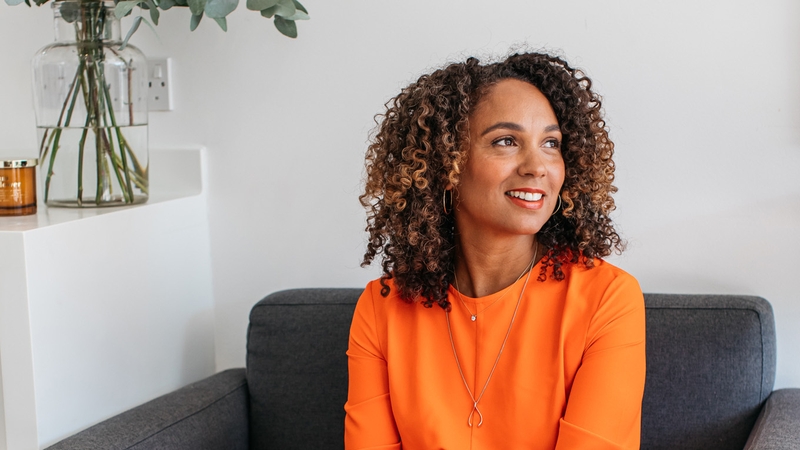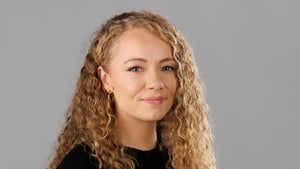Celebrating 10 years of success, Bouclème founder CEO Michele Scott-Lynch sat down with RTÉ Lifestyle to discuss the importance of curl representation, the ways in which she hopes to make an impact on the world, and why she wants to limit her line.
"I kept it really simple, with just three products," Michele says, reflecting on the early days of her business, a self-funded venture assembled on her kitchen table.
As a mixed race woman with two curly-haired daughters - one with thick coils, the other fine curls - the CEO says she found it impossible to find products that would work for all three of them. So she made them herself.
"It was about finding the perfect bridge," she says of her plant-based line. "There's such a diverse category [of curls], so, for me, it was about trying to find three products that could be used in a versatile way for different curl types.
"Nothing is perfect, right? But you try to get as close as you can - and that's what we did."
We need your consent to load this Instagram contentWe use Instagram to manage extra content that can set cookies on your device and collect data about your activity. Please review their details and accept them to load the content.Manage Preferences
These days, those with the tightest of coils or slightest of waves can access online hair tutorials specific to their curl pattern, and order any number of products their heart desires, with celebrities like Beyoncé and Tracee Ellis Ross launching serums and masks to suit every texture.
Pre-internet, however, the haircare scene in Ireland and the UK looked exponentially different.
"Curly hair just wasn't a thing then," Michele says of her tangled childhood. "My mum didn't know how to make it curly, so she would just brush my hair - which we know doesn't work - and plait it. When I got to the age where I could wash my hair, I realised it looked quite nice when it was wet, but it would just dry into this frizzy mess."
As a result, the future CEO decided to chemically relax her hair throughout her late teens and early 20s, all in the pursuits of styles that would simply never work for her.
"I remember being 19 and seeing Naomi Campbell on the cover of Vogue," she muses. "She had this short, straight bob, so I took that into a hairdresser and said 'I want that'. I mean, imagine! And the hairdresser tried to do it. Now, I look back and I think she should have just explained to me that it was a wig. I had no idea, I was clueless."
We need your consent to load this Instagram contentWe use Instagram to manage extra content that can set cookies on your device and collect data about your activity. Please review their details and accept them to load the content.Manage Preferences
When she reached the age of 30, the London woman picked up a copy of The Autobiography of Malcolm X, and gained a fresh perspective on the intricate ties between hair and identity.
"He talks about the chemical relaxing of hair, and how the cream you put on your hair kind of burns your scalp to turn your curls straight," she explains. "You can end up with scabs and weeping - really bad - and he called it a form of self degradation in order to conform with the Western concept of beauty, which is smooth, sleek, flowing locks."
"When I read that, it just completely resonated," she says. "It was exactly what I was doing and from that moment on I knew I would never do it again."
When her search for quality curly haircare came up short, she began to experiment with creating her own plant-based products that would be kind to both the environment and her body.
"Thank God for the internet," she laughs. "There was a global community of people sharing their struggles and tips, and that helped me find my way through. From there, I started making conditioners and gels in my kitchen."
We need your consent to load this Instagram contentWe use Instagram to manage extra content that can set cookies on your device and collect data about your activity. Please review their details and accept them to load the content.Manage Preferences
Ahead of her time in many ways, Michele says that sustainability and ethics were core values of the brand since its conception.
At the time, deforestation was a hot topic in the media, so after a lot of research (courtesy of her eco-minded stepfather) Michele paired up with an American non-profit called Trees for the Future: "From the moment we launched, if you bought a standard sized product, we planted a tree with them."
Additionally, the brand have shredded their unused bottles in the hopes of transforming them into a collection of claw clips, while their range of hair brushes are partly made from plant starch which will biodegrade under the correct conditions.
"I think of Bouclème as a conscious company, which, for me, means that when you buy our products, they work for you but, outside of that, they work for the community," she says, listing a number of charities that the brand has campaigned for over the past ten years.
We need your consent to load this Instagram contentWe use Instagram to manage extra content that can set cookies on your device and collect data about your activity. Please review their details and accept them to load the content.Manage Preferences
Reflecting on her 10 years of hard-earned success, the CEO says that she has learned endless lessons from the self-funded venture.
Moving forward, with a compact staff of 11, she plans to focus on quality over quantity: "Some brands have millions of products and you don't know where to start - I don't want to be one of those. Everything that we launch is something that we think about carefully."
"I hope Bouclème helps people to feel that they can embrace what they naturally have," she surmises. "For me, bringing out the range was always about enabling people to wear their hair how they want, and to feel beautiful, to feel confident, and to feel good."

